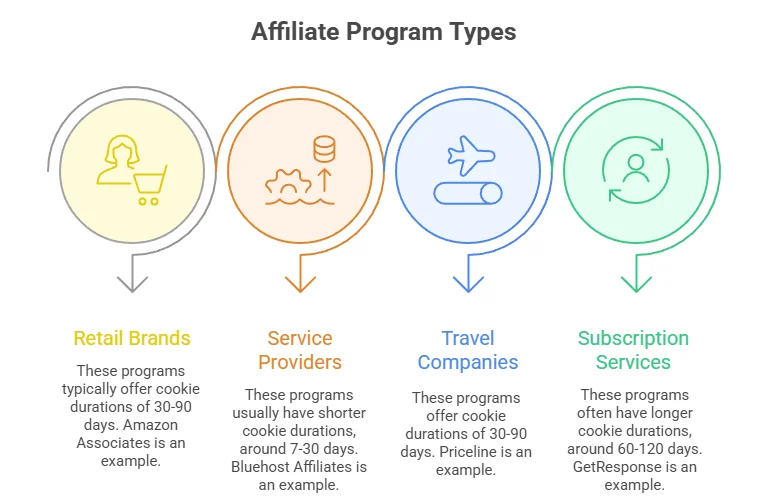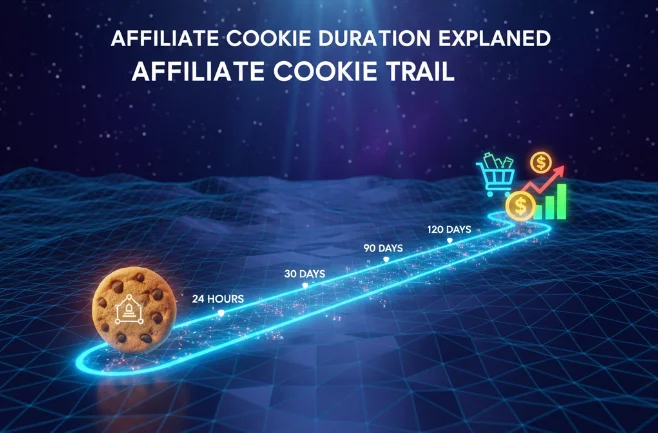
When it comes to affiliate marketing, understanding cookie duration is essential for optimizing your strategies and maximizing conversions. Cookies are files placed on a user’s device by websites they visit, allowing those websites to remember user information for various purposes. In affiliate marketing, cookies play a critical role in tracking referrals and sales. This article provides a full breakdown of Affiliate Cookie Duration and its impact. While tracking cookies is a vital part of the game, the real secret to hitting $10k months is moving beyond manual links and using the proven systems found in the Revenue Accelerator to automate your entire income stream. 🚀
What is Affiliate Cookie Duration?
Affiliate cookie duration refers to the amount of time a cookie stays active on a user’s device after they click on an affiliate link. This duration can significantly vary among different affiliate programs. For instance, one program may set its cookie duration to 30 days, while another could set it to as little as 24 hours or extend it to 90 days. The duration is crucial because it determines how long you will receive commissions on sales generated from your referred visitors.
Why is Cookie Duration Important?
Understanding cookie duration is vital for creating effective marketing strategies. Here’s why:
- Tracking Effectiveness: A longer cookie duration means more time for potential customers to make a purchase, increasing the chances of earning commissions.
- User Behavior: Consumers often need time to make purchasing decisions. If your cookie duration is short, you risk losing out on commissions if they don’t buy immediately.
- Marketing Tactics: Different cookie durations may require diverse strategies. Understanding these dynamics allows marketers to craft targeted campaigns that align with the duration and enhance conversion rates.
Typical Cookie Durations in Affiliate Marketing
Here’s a general overview of typical cookie durations in affiliate marketing:
| Affiliate Program Type | Typical Cookie Duration | Example Programs |
|---|---|---|
| Retail Brands | 30-90 days | Amazon Associates |
| Service Providers | 7-30 days | Bluehost Affiliates |
| Travel Companies | 30-90 days | Priceline |
| Subscription Services | 60-120 days | GetResponse |
How to Choose the Right Affiliate Programs
Selecting the right affiliate programs involves several considerations, especially regarding cookie duration:
- Research Cookie Policy: Always check the cookie duration of the affiliate programs you’re interested in. Choose programs that align with your audience’s buying habits.
- Analyze Your Audience: Understand the behavior of your audience. If they take time to convert, opt for programs with longer cookie durations.
- Track Your Performance: Regularly assess the effectiveness of the affiliate programs you join. Examine how cookie duration impacts your conversion rates and overall sales.
Strategies to Maximize Earnings with Cookie Duration
Once you understand cookie duration, you can apply strategies to enhance your affiliate marketing efforts:
- Create Engaging Content: Whether it’s blogs, videos, or social media posts, engaging content can lead to a higher click-through rate, increasing the chances of conversion within the cookie window.
- Use Reminders: Send follow-up emails or messages reminding your audience of the products they viewed. This can encourage them to return to complete their purchases before the cookie expires.
- Leverage Retargeting Ads: Use retargeting campaigns to remind past visitors of the products. These ads can keep your offers top-of-mind and enhance conversions.
Comprehending the intricacies of affiliate cookie duration is key to driving success in your marketing endeavors. By selecting the right programs, understanding your audience, and utilizing effective strategies, you can maximize your affiliate revenue and improve your overall marketing performance. For further insights and resources related to affiliate marketing, consider visiting Impact or ShareASale.
The Difference Between Session Cookies and Persistent Cookies in Affiliate Marketing
In the world of affiliate marketing, understanding cookies is key to tracking and optimizing your performance. Among the different types of cookies that websites use, session cookies and persistent cookies play unique roles. These cookies are crucial for how affiliate programs measure success and for how you, as an affiliate marketer, can manage your strategies effectively.
What Are Session Cookies?
Session cookies, also known as temporary cookies, are designed to help track a user’s activity during a single browsing session. When you visit a website, these cookies are created and stored in your browser’s memory. Once you close your browser, these cookies are deleted automatically. Here are some essential points about session cookies:
- Temporary Storage: They are used for single sessions and are cleared when the browser closes.
- User Tracking: They help in tracking user behavior on a site by recording actions taken within that session.
- Enhanced UX: They improve user experience by allowing features like keeping items in a shopping cart during the same visit.
For affiliates, understanding session cookies is vital as they determine the actions a user takes while visiting a site. If a customer clicks on your affiliate link and makes a purchase before closing their browser, the session cookie can help ensure your commission is tracked and attributed correctly.
What Are Persistent Cookies?
Unlike session cookies, persistent cookies remain on a user’s device even after the browser is closed. They have a set expiration date and can last from a few days to several years, depending on the settings configured by the website. Here are some key characteristics of persistent cookies:
- Long-Term Storage: They are stored on the user’s device and can be used over multiple browsing sessions.
- User Preferences: They are often used to remember user preferences, such as login information or language settings.
- Targeted Advertising: They help in creating personalized marketing experiences based on users’ past behavior.
For affiliate marketers, the importance of persistent cookies can’t be overstated. They can help in observing user behavior over a longer period, allowing marketers to craft more targeted campaigns. For instance, if a user visits an affiliate site and is later served ads based on their previous interactions, the persistent cookie plays a crucial role in that personalized experience.
Session Cookies vs. Persistent Cookies in Affiliate Marketing
| Feature | Session Cookies | Persistent Cookies |
|---|---|---|
| Duration | Temporary (deleted after closing the browser) | Long-term (valid until expiration date) |
| Purpose | Track user’s actions during one session | Remember user preferences and past behaviors |
| Best For | Real-time tracking of a user’s visit | Long-term marketing strategies and retargeting |
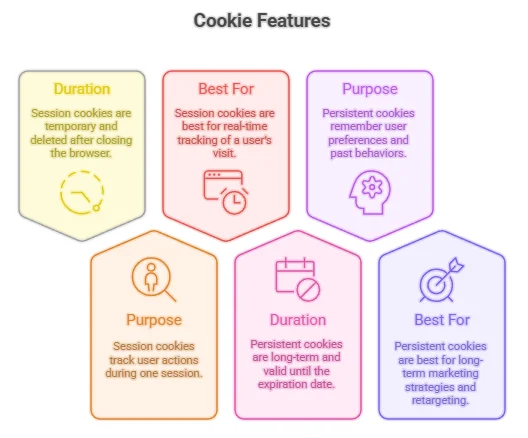
This comparison highlights that both cookies serve different methods of engagement and measurement in affiliate marketing. While session cookies help track immediate actions, persistent cookies can provide valuable insights for ongoing campaigns and customer relationships.
Why Understanding Cookie Duration Matters in Affiliate Marketing
The duration of cookies is fundamental for understanding how affiliate commissions are tracked. If an affiliate program uses session cookies, you might only receive credit for sales that happen during a single visit. However, if persistent cookies are in play, you can receive commissions from sales that occur days or even weeks after the initial click. This difference can greatly impact your earning potential. You should check the cookie duration policies of the affiliate programs you are part of. For example, some programs might have a cookie duration of 30 days or longer, encouraging users to revisit the site later before making a purchase. The details of affiliate cookie duration can be seen as essential knowledge for every affiliate.
Educators like ShoutMeLoud and Affiliate Funnel delve deeper into how these cookies can be effectively utilized in your marketing strategies.
Both session cookies and persistent cookies have their roles in affiliate marketing. Understanding their functionalities can help you optimize your strategies, track performance effectively, and maximize your commissions. Make sure to leverage these insights in your affiliate marketing efforts for better results.
Best Practices for Maximizing Affiliate Sales within the Cookie Duration
Understanding the role of affiliate cookies is crucial for anyone looking to maximize their affiliate sales. Cookies serve as the backbone of affiliate marketing, allowing marketers to track user activity and commissions linked to their referrals. Awareness of cookie duration is a pivotal strategy that can significantly enhance your sales performance.
Cookie duration refers to the period during which a cookie remains active on a user’s device after they click on your affiliate link. When users purchase within this timeframe, the affiliate earns a commission. Each program has a different cookie duration, ranging from a few days to several months. Recognizing how to optimize your efforts within this timeframe can lead to better conversions and higher commissions.
Strategies to Maximize Affiliate Sales Within Cookie Duration
Here are some effective strategies to help you make the most out of your affiliate cookie duration:
- Choose the Right Affiliate Programs: Select programs with longer cookie durations. Some programs offer cookies that remain active for up to 90 days, while others may last only 24 hours. Researching the terms of various affiliate programs could make a significant difference in your earnings.
- Create High-Quality Content: Your content should not only be informative but also engaging. Focus on resolving your audience’s problems. Quality content keeps users on your page longer and increases the likelihood of them clicking through your affiliate links.
- Utilize Email Marketing: Leverage your email list to promote products with a longer cookie duration. When you send valuable content paired with exclusive deals, you encourage readers to click on affiliate links, boosting your chances of making sales.
- Implement Retargeting Ads: Retargeting ads remind users of products they viewed but didn’t purchase. These ads, running on platforms like Facebook and Google, keep your affiliate products in front of potential buyers, extending the chances of sales during the cookie period.
- Optimize for Mobile: With the majority of internet users browsing on mobile devices, ensure that your affiliate links and content are mobile-friendly. A seamless user experience increases the likelihood of conversions.
Understanding the Impact of Cookie Expiration
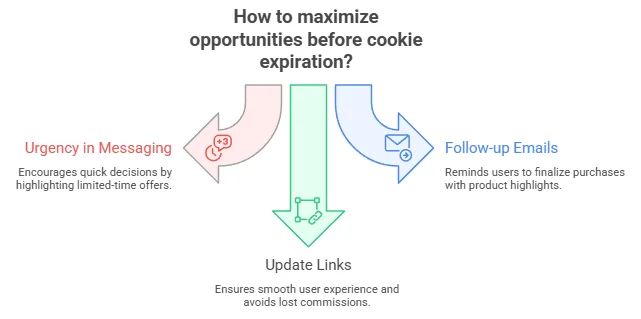
As the cookie duration approaches its expiration, you’ll want to take specific actions to maximize the window of opportunity:
- Urgency in Messaging: Create a sense of urgency around the products you promote. Words like “limited time offer” or “last chance” can encourage users to make quick decisions before their cookie expires.
- Follow-up Emails: If you have an email list, send a reminder before the cookie expires. A short message that highlights the products or deals can prompt users to finalize their purchases.
- Regularly Update Links: Ensure that all affiliate links are functioning properly. Broken links can lead to lost commissions and frustrated potential buyers. Regular maintenance ensures a smooth user experience.
Leveraging Analytics to Enhance Strategy
Using analytics tools is essential to understand consumer behavior and adapt your approach:
- Track Click-through Rates: Monitor how often users click on your affiliate links. This information can signal which types of products resonate most with your audience.
- Analyze Conversion Rates: Determine what percentage of visitors convert after clicking your affiliate link. High conversion can indicate the effectiveness of your promotional methods.
- Adjust Based on Performance: Be prepared to tweak your campaigns based on analytics. If certain products perform better, consider allocating more resources towards their promotion.
Staying Informed on Industry Changes
The digital marketing landscape is continually evolving, and staying informed about best practices is crucial for maintaining your affiliate revenue. Regularly check blogs such as Affiliate Inf and The Affiliate Post for up-to-date strategies and industry trends.
By focusing your efforts on maximizing your affiliate cookie duration, you not only increase your chances of earning commissions but also enhance your overall effectiveness as a marketer. Balancing quality content creation with strategic promotional efforts is key to thriving in the affiliate landscape. These strategies into your affiliate marketing plan can lead to substantial sales growth, extending your potential commission earnings effectively. The cookie is your temporary connection to potential income—understanding its duration can equip you for greater success.
How Cookie Duration Affects Consumer Behavior and Purchase Decisions
Understanding how long an affiliate cookie lasts is crucial for both marketers and consumers. The duration of an affiliate cookie—often referred to as cookie duration—can significantly shape consumer behavior and influence purchase decisions. Let’s dive into the details of how this mechanism works.
When you click on an affiliate link, a cookie is placed on your browser. This cookie essentially tells the retailer that you were referred by a partner. Most importantly, the cookie has a specified duration. If you make a purchase within this timeframe, the affiliate earns a commission. But what happens after that duration expires?
Short cookie durations can lead to missed opportunities for affiliates. For example, if a cookie lasts for just 24 hours, consumers might need to rush to make a purchase. This urgency can result in impulsive buying decisions. On the contrary, longer cookie durations can create a more relaxed shopping environment. Consumers have time to think things over, compare products, or even seek out reviews.
It’s essential to recognize how cookie durations might impact consumer behavior:
- Impulsive Purchases: A short duration may pressure consumers to decide quickly, often leading to impulse buys.
- Comparative Shopping: With longer cookie durations, shoppers can take their time, often leading to better-informed and potentially more satisfied purchases.
- Brand Loyalty: If consumers see a product they like but need time to consider, a longer cookie could increase the chances they’ll purchase later through the same affiliate.
Common Cookie Duration Examples
Different companies set different cookie durations based on their marketing strategies. Here are some common examples:
| Cookie Duration | Example Brands |
|---|---|
| 24 Hours | Many online retailers |
| 30 Days | Amazon Associates |
| 90 Days | eBay Partner Network |
| 180 Days | Booking.com |
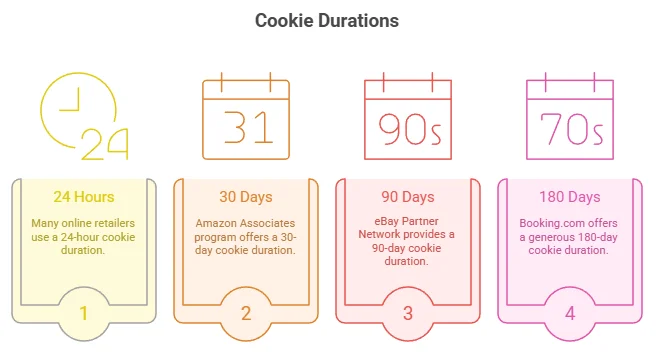
It’s clear that cookie duration affects how consumers interact with affiliate products. With a short duration, customers may feel rushed, which could lead to hasty decisions. Longer durations encourage contemplation, which may boost confidence in their purchase. Moreover, an extended window allows shoppers to return at their convenience, knowing that their original affiliate link still applies.
Additionally, cookie duration plays a role in marketing campaigns. For instance, seasonal sales and promotions can be effectively leveraged with appropriately timed cookies. If an affiliate promotes a special event that lasts for a week, setting a matching cookie duration can enhance conversion rates.
Moreover, this concept is relevant to both consumers and businesses. As a consumer, knowing how cookie durations work can enhance your shopping strategy. You can decide when to make purchases based on the urgency applied by cookie settings. For businesses, understanding the implications of cookie duration enables better planning for affiliate partnerships.
It’s essential to note that affiliate marketing continues to evolve. Cookie policies change, making it necessary for both marketers and consumers to stay informed. Resources are available on platforms like Digital Marketing Institute that explain the nuances of this landscape. The details of affiliate cookie duration can offer a powerful competitive edge.
Cookie duration is a powerful tool that can sway purchasing behaviors. By giving consumers adequate time to consider products, longer cookie policies may lead to higher satisfaction levels and potentially increase sales for affiliates. In contrast, shorter cookie durations might drive immediate sales, albeit at the risk of less informed decisions. By understanding these dynamics, both consumers and marketers can make more strategic choices that align with their buying habits or sales goals.
Analyzing Different Affiliate Programs: Cookie Duration and Their Effectiveness
When diving into the world of affiliate marketing, understanding cookie duration is crucial. Cookie duration refers to the amount of time a cookie remains in the user’s browser after they click on an affiliate link. This timestamp plays a significant role in determining how affiliates get credited for conversions. Let’s take a closer look at various affiliate programs and how their cookie durations affect their effectiveness.
Affiliate programs can vary significantly when it comes to cookie duration. Here’s a breakdown of typical cookie durations offered by different programs:
| Affiliate Program | Cookie Duration | Notable Features |
|---|---|---|
| Amazon Associates | 24 hours | Wide selection of products; earns commissions on total cart value |
| ShareASale | 30 days | Diverse merchants; varying commission rates |
| ClickBank | 60 days | Digital products; high commission potential |
| Commission Junction (CJ) | 7 days to lifetime | Many brands available; performance-based options |
| eBay Partner Network | 24 hours | Access to auction and fixed price listings; competitive rates |
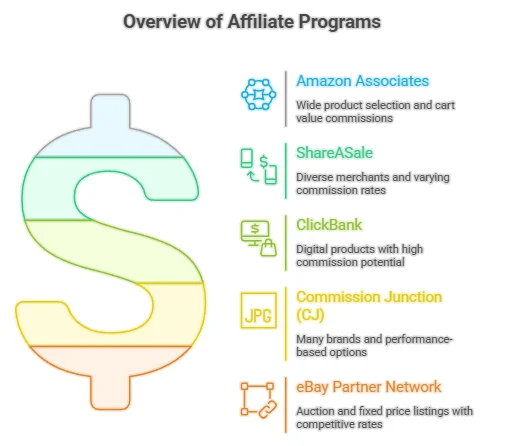
Understanding how cookie duration works will help you choose the best affiliate program for your niche. Short cookie durations mean that you need to encourage immediate purchases from your audience. If you’re promoting a product with a 24-hour cookie, it’s critical to have compelling content that drives users to buy quickly. On the other hand, longer cookie durations can allow for a more extended consideration phase, which is beneficial for big-ticket items that require more thought before purchasing.
For instance, if you join a program like Amazon Associates with a 24-hour cookie duration, you need to create urgency. Suggesting limited-time deals or special discounts can motivate visitors to complete their purchases more swiftly. In contrast, a program like ClickBank with a 60-day cookie gives you the opportunity to engage your audience over time. You can follow up with newsletters, reminding them about the products they might have considered previously.
Another critical factor to consider is how cookie duration aligns with your marketing strategy. For example:
- Product Type: High-value items may benefit from longer cookie durations. Users might require time to think it over before making a purchase.
- Traffic Sources: If your traffic comes from social media, a shorter cookie duration might be effective as people on social tend to make quicker decisions.
- Buyer Behavior: Understanding the demographics and behaviors of your audience can help you predict how they will act within the cookie timeframe.
Cookie durations can also vary within the same program. For instance, some affiliate programs may offer different cookies for different products. This variability impacts how you can create content that aligns with both the duration and the product being promoted. The topic of Affiliate Cookie Duration Explained fully is crucial for maximizing profit.
When selecting an affiliate program, it’s essential to evaluate the average conversion rates alongside cookie duration. Lengthy cookie times can result in higher conversions over time as potential buyers are probed with persuasive content repeatedly. Programs such as ShareASale provide numerous options with extended cookie durations, potentially increasing your earnings as you establish trust with your audience over time.
Stay aware of cookie policies and local regulations. Some regions have strict laws regarding tracking cookies and user privacy. Make sure to comply with these laws while utilizing affiliate links, ensuring both trust with your audience and adherence to legal standards.
Cookie duration significantly influences the effectiveness of different affiliate programs. By understanding the implications of cookie duration, you can make informed decisions that enhance your affiliate marketing success. Make sure to analyze programs thoroughly, considering how cookie duration aligns with buyer behavior, product types, and your overall marketing strategy.
Conclusion
As you navigate the world of affiliate marketing, understanding cookie duration becomes essential for building effective strategies that resonate with your audience. The impact of cookie duration on your marketing approach cannot be overstated. Knowing the difference between session cookies and persistent cookies allows you to tailor your campaigns to fit consumer behavior and needs.
Maximizing your affiliate sales within the cookie duration means adopting best practices, such as creating urgency and providing valuable content, which can significantly boost conversions. Cookie duration directly influences how consumers make purchase decisions, emphasizing the importance of timely engagement and follow-ups. The full scope of affiliate cookie duration provides a road map to success.
Moreover, analyzing various affiliate programs reveals how cookie durations vary and the effectiveness of each program. By comparing these differences, you can identify opportunities that align with your marketing goals and target demographics.
Ultimately, taking the time to understand and leverage cookie duration in your affiliate marketing efforts will not only enhance your strategies but also foster stronger connections with your audience. You can steer your campaigns toward higher success rates and achieve a more sustainable affiliate income. Embrace the insights shared in this article, and watch how thoughtful implementation of cookie duration knowledge can transform your affiliate marketing journey.

